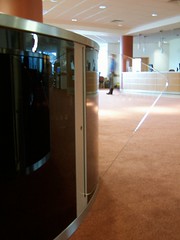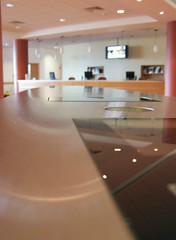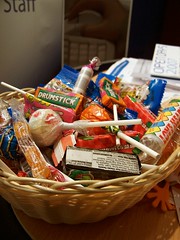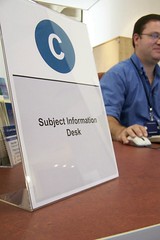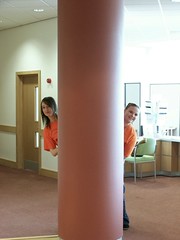It’s on days like this that I’m glad we no longer live in Armitage Bridge, but halfway up a hill which looks down on Armitage Bridge.
The BBC web site has this photo of Armitage Bridge…

After spending several minutes wondering if the Armitage Bridge that I knew (which is mostly traditional old stone houses) had been washed clean away and replaced by a row of newer looking red brick houses, I noticed that the file name of the image mentions Doncaster (which is at least 50 miles away).
The local newspaper has this video, although be warned that the narrator sounds like she using a megaphone.
Quite a few local roads have been closed and the area at the south of the University campus (Aspley & Bradley Mills) is still subject to a severe Flood Warning from the Environment Agency.

Tag: huddersfield
Dear Facebook, Huddersfield is not in Northern Ireland
I was really tempted to create a protest group in Facebook but, for some reason best known only to themselves, the people at Facebook are insisting that Huddersfield is really somewhere in Northern Ireland…

Even though the correct option is there (“Kirklees, United Kingdom”), it always changes it to “Huddersfield, Northern Ireland” when you click on the save button.
I wouldn’t mind, but there isn’t even a Huddersfield in Northern Ireland!
To get to Northern Ireland from Huddersfield, I’d have to drive for about 8 hours, catch a ferry to travel 50 miles to another country, change all my money into a different currency, and I’d have to remember to take my passport with me.
So, please Facebook — Huddersfield is in England, which isn’t the same thing as Northern Ireland!!!
“Engaging the Xbox generation of Learners in Higher Education”
Just a little pointer towards a report recently released by Jebar Ahmed and Mary Sheard in the School of Education at the University of Huddersfield:
New generation learners seem to be surrounded by technologies everywhere, at home, at school and in their pockets. Computers and interactive white boards are available in the classrooms, but how do these learners engage with technologies to actually learn? And what can we learn from them to inform teaching in HE?
The Executive Summary is available here.
Patrick Stewart in the Library
It’s not every day that you get a former Captain of the starship Enterprise in your Library, but today was one of those days! Patrick Stewart is the current Chancellor of the University of Huddersfield, and was born just down the road in Mirfield.
The refurbished library opened it’s doors to students in September (see photos), but today was the official opening ceremony of the Student Centre (which is the entrance floor of the library). To celebrate the event, we had a string quartet playing in the foyer, and Patrick Stewart gave a speech and unveiled a plaque.



No sooner had Patrick walked in, he headed straight for the Info Desk…

Lisa (left) is looking slightly surprised and that’s my better half Bryony sat on the right.

After an entertaining speech…

…Patrick unveiled the plaque…

…drinks were served…

…and he personally thanked the library staff for their hard work over summer…

I’d thoroughly recommend getting a string quartet to play in your library entrance — it definitely sets a nice ambience 🙂
What day of the week is it?
I’m getting to the point where I don’t know if I’m coming or going, but I do know I’m having a lot of fun!
Yesterday was the JIBS Workshop in London (photos here & presentation here). There’s lots I’d like to say about the debate that ended the workshop — especially regarding Nick Woolley’s narrow definition of “Library 2.0” — but it’ll have to wait for another day. In the meantime, if you’ve not seen it before, I’d recommend reading Cites & Insights 6.2 (from late 2005) for Walt Crawford‘s take on the various early definitions of Library 2.0.
Tomorrow it’s a 90 minute workshop on “2.0” (with the emphasis on play) at the National Science Learning Centre in York.
Today was really cool — Cathy Slaven (Library Systems Manager, Queensland University of Technology, Brisbane, Australia) dropped in to sunny* Huddersfield for a few hours of “2.0” chat, a bit of mutual Pixies worship, and a swift half of Black Sheep at the Head of Steam. If there isn’t a Facebook group called “Library Systems Managers who like the Pixies” yet, then there should be!

I’m extremely grateful that she chose to make Huddersfield one of her stopping points in her brief tour of the UK and Ireland, and I could have happily chatted all day long! All the very best wishes for the rest of your visit Cathy, and I hope you enjoy travelling through Europe to Vienna 🙂
Next week, I’m heading off to OCLC’s office in Leiden for a day long developer’s meeting. The day after, I need to be in Stoke-on-Trent for the SirsiDynix Symphony Development Forum. The trouble is, I’ve just discovered that there are no trains after 9:35pm from Birmingham International Airport to Stoke-on-Trent (where I’m already booked into a hotel) and I don’t land until 9:45pm! If I’m lucky, I should be able to get the last stopping train to either Stafford or Crewe, then a 15 mile taxi ride to Stoke-on-Trent, and hopefully arrive at the hotel sometime after midnight :-S
The week after that, it’s Online Information 2007 (which lasts 3 days).
…roll on the Christmas holidays! 😉
—————–
* I lie, it rained… it rained a lot!
Library Refurbishment
The entrance floor of the University of Huddersfield Library has been closed all summer for a major refurbishment. Today, we opened the doors to the “Student Centre” (the new name for the entrance floor) in time for Welcome Weekend and the start of Fresher’s Week.
Apart from the refurbishment, the new Student Centre hosts service points for the various Student Services which were previously housed elsewhere in the Central Services Building. This is great news for our students, as the majority of the services they require to support them during their studies are now in one place.
Even more exciting (for me, anyway!) — we get delivery of our new RFID book sorter on Monday morning 🙂
You can see all of the images from this morning in this Flickr set (or as a slideshow). Here are some of my favourites…
We’ve even managed to tweak our OPACs so that the screensaver matches the new colour scheme 🙂
Twittering the OPAC
I noticed that a few other people have been blogging about how they’re using Twitter within their own library, so here’s how I’ve been (ab)using my Twitter feed…
http://twitter.com/daveyp
Last year, I set up some data feeds from the library that our students could hook into for their projects. This data includes a file listing the keywords used in the last 50 searches on the OPAC and their frequency.
The file is also used to generate this keyword cloud (which ignores words with a frequency of only 1).
Anyway, after getting bored with manually updating Twitter myself, I decided to hook it into the keyword file. Every few minutes, an automated script checks the file for the most frequently used keyword(s) from recent searches, and sends it off to Twitter.
I’m not sure if it really serves any useful purpose, but it’s kinda fun to see a top-slice of what our users are searching for. Occasionally the keywords link together to make weird statements…
- bereavement dummies
- offenders practice young
- gogh nursing van
- krishna promoting sap
- and garside libraries research taylor
- education harpsichord
- mysql war
- dog music psychology
- bean communication
…so, the next time Twitter crashes, you can probably blame me 😀
Check out these trends
…sorry, but that was the best blog title I could come up with at 10pm after a long day 😉
In a previous post, I mentioned that the circulation figures were up for the year so far (when compared to 2006). That got me wondering what the long term trend was for items checked out. Unfortunately there are some sizeable gaps in the historical data (as stored on Horizon), otherwise I’d be able to go back as far as 1996.
Anyway, here’s how the number of check outs per month pans out since 2000…
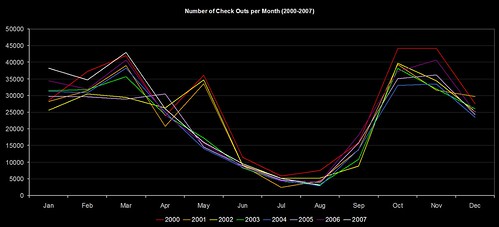
…or if you prefer your lines to be smoother…
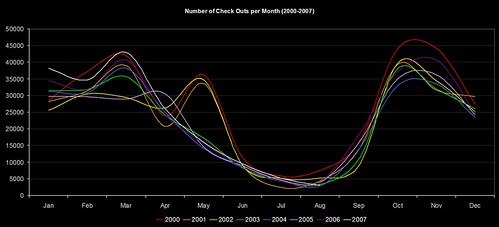
The CKO data for this year is in white.
There’s a marked change after 2002 in the period around May, and (if memory serves me right) the structure of our academic year changed in September 2002. The overall figures indicate that we had a slight decline around 2003, but it’s been climbing gradually since then. So, much as I’d love to take the glory for our increased CKOs this year, it’s probably just following the recent trend.
Finally, here’s the same graph, but adjusted for an “academic year” (Sep-Aug)…
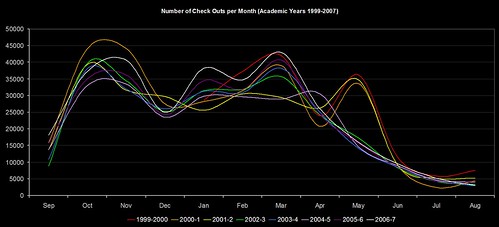
If you build it, they’ll come back for more!
I’m just busy putting together slides for some of the upcoming presentations and I thought it was about time I trawled through some of the OPAC usage stats to see if our students are still using some of the OPAC tweaks we’ve made.
The good news is that they are, and then some more!
First up, here’s the overall usage for 4 of the tweaks (May 2006 to July 2007):
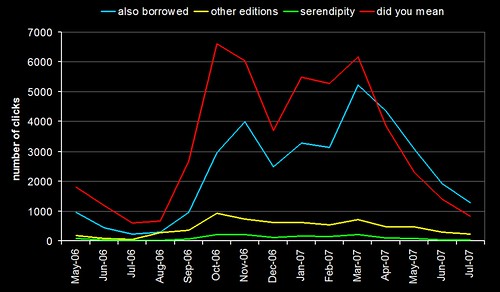
At first glance, nothing too surprising — the overall trend follows the academic year, with the lull over summer.
What did leap out was the blue line (clicks on “people who borrowed this, also borrowed…” suggestions) — since this April, the usage has been higher than the “did you mean” spelling suggestions (red line). So, either our users have suddenly become better spellers, or they’re making much higher usage of the borrowing suggestions. If I was a betting man, I’d say it was the latter.
We’ve now got enough data to compare the same 3 months in 2006 and 2007 (May to July):
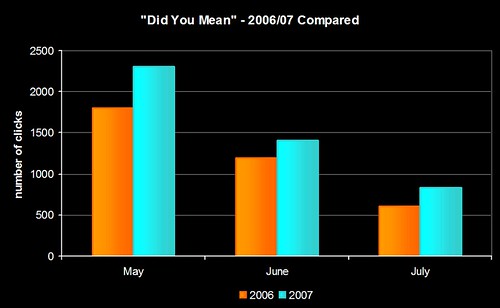
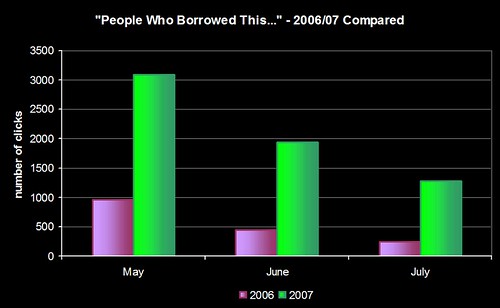
That second graph is why I’m sat here with a grin like a Cheshire Cat 😀
[update]
I’ve dug out the circulation stats for the same period and that re-inforces the statement that the students are making much higher usage of borrowing suggestions in 2007 than in 2006. You can see that the number of check outs (bold pink) pretty much matches the number of clicks on the “did you mean” spelling suggestions (red line in the first graph). Check outs have also risen in 2007 when compared to the same months in 2006.
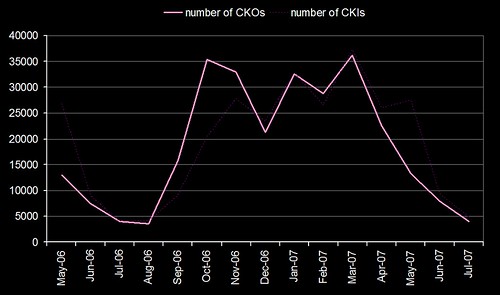
Interestingly, I don’t think we’ve ever had a student go up to a member of staff and say “I’ve found the suggestions really useful” or “thank you for adding spell checking”. I wonder how many complaints we’d get it we turned the features off?
Shock horror — local area makes it onto BBC News site!
It’s not often that the area where we live gets a mention on the BBC News web site:
“Homes evacuated amid factory fire”
…in fact, the last time might well have been this story about a local inventor who was attacked by a squirrel.
Unfortunately the main road where we live is still closed by the police, so it’s going to be fun getting back home tonight!
